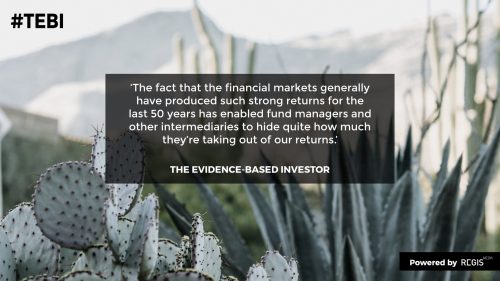I still remember my excitement as a child visiting the Rackhams department store in Birmingham in the January sales. Being able to buy, with my own pocket money, games and toys reduced to to a fraction of the price they were before Christmas seemed almost too good be true.
Of course, stores don’t wait until January to hold a sale nowadays. We even have them in the run-up to Christmas. Most Brits hadn’t even heard of Black Friday till a few years ago; it’s now an institution, with shoppers expected to spend £10 billion this coming Black Friday alone.
It’s funny, we all love a bargain. We drive out of our way to save a penny on a litre of petrol. Our eyes light up (mine do anyway) when we find our favourite bottle of wine on special offer in the supermarket. And yet we happily pay ten times or more than we need to on what for many of us will be the biggest purchase we make in our lives, namely our retirement pot.
Ten times, you may be thinking, sounds a heck of a lot. Surely he’s exaggerating? In fact, I’m not. Ten times is, in fact, a conservative estimate. Let’s look at the figures.
Investing in an index fund nowadays will cost you about 25 basis points, which is another way of saying a quarter of 1%. (Actually, you don’t have to pay that much, but let’s say you pay 25.) Most people don’t use index funds. They use active funds instead, for which they typically pay an annual management charge of 1%. But that’s not all. Once transactions costs and other fees and charges (many of them hidden) are included, they generally pay far more.
In his 2014 paper for the Financial Analysts Journal, The Arithmetic of ‘All-In’ Expenses, Jack Bogle calculated the total cost of active management to be, on average, 2.27%. That, however, is the figure for the US, where fund management costs are the lowest in the world. Dr Chris Sier, who’s currently working with the Financial Conduct Authority on improving cost disclosure, has put the figure here in the UK at around 3.1%, or 310 basis points.
As Bogle himself has said, the choice between index funds and active funds essentially boils down to cost. Yes, index funds do offer much greater diversification, which has been proven to provide substantial benefits. But otherwise, there’s little to choose between them. If there were no costs involved, their average returns of index funds and active funds would be very similar. The key difference is that one is hugely more expensive than the other.
Investing is something almost everyone needs to do. It’s a staple — the financial equivalent of bread and milk. But no one in their right mind would pay £12 for a loaf of bread or £5 for a pint of milk.
Remember, these aren’t one-off purchases. We’re paying to have our money managed all the time and, typically, we pay for it for 40 or 50 years for more. Imagine, then, paying at least ten times over the odds every time you buy bread and milk between now and 2060.
Let’s put it another way; imagine taking out a mortgage to buy a house for £1 million when you can buy an almost identical house next door for less than £100,000. Imagine, every time you change your car for the rest of your motoring life, paying ten times more than you need to. Imagine, say, paying more than £200,000 for a new Ford Focus, and overpaying by a similar amount every time you buy a replacement.
So, why do we keep on paying ridiculous amounts for people to manage our money? PR and advertising, our behavioural biases and our lack of understanding of how the industry works are all important factors. But for me, the most important factor of all is that we’re never sent a bill. We’re never shown, in pounds and pence, exactly what we’re paying. The money just disappears without our even noticing.
The fact that financial markets generally have produced such strong returns for the last 50 years has enabled fund managers and other intermediaries to hide quite how much they’re taking out of our returns. If, as many are predicting, long-term returns will be lower in future, they’re going to find it harder to do.
In any event, I truly believe that one day we’ll look back at these last few decades and ask: Why was everyone quite so gullible? Why, every day, did so many people pass the permanent Sale signs in the index fund shop without ever thinking to look inside?
ROBIN POWELL is the founder and editor of The Evidence-Based Investor. A freelance journalist, he runs Regis Media, a specialist content marketing consultancy for financial advice firms around the world. You can follow him on Twitter and on LinkedIn.
The Evidence-Based Investor is produced by Regis Media, a boutique provider of content and social media management to financial advice firms around the world. For more information, visit our website and YouTube channel, or email Sam Willet or Christina Waider.
How can TEBI help you?









